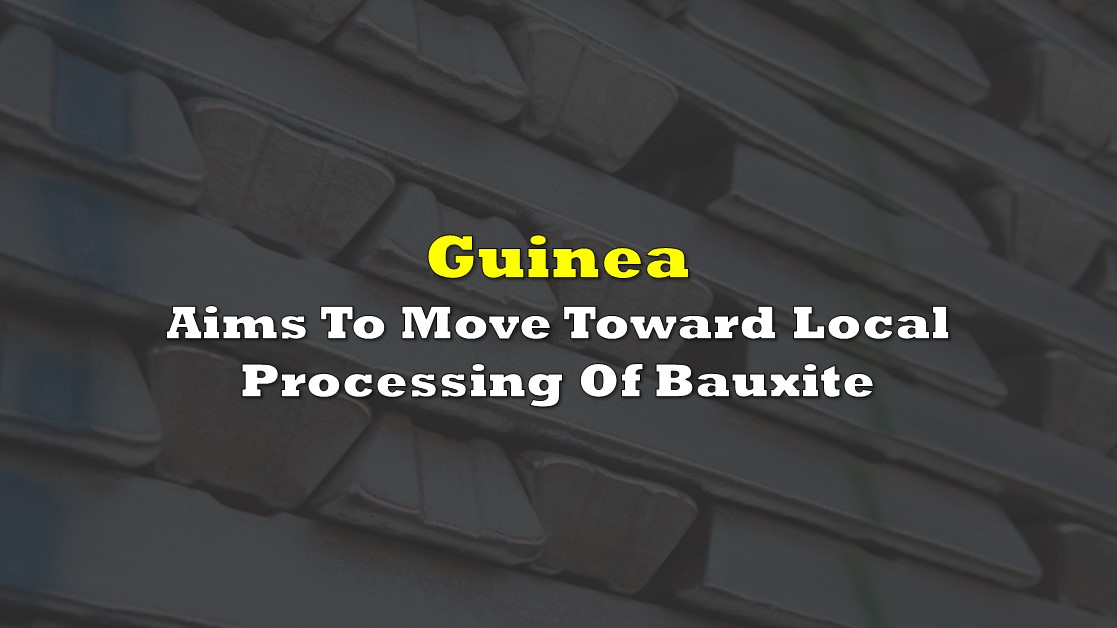Guinea, renowned for its bauxite exports, is working towards local processing of the ore. Prime Minister Amadou Oury Bah announced the imperative for local processing, marking a strategic shift for the West African nation. The comment suggests an export ban may be coming on the matter, however when, or if, changes will be implemented remain unclear.
"La Guinée, longtemps exportatrice de bauxite, doit passer à la transformation locale selon Premier Ministre Amadou Oury Bah. La junte actuelle s'engage, mais exigences restent floues. #Guinée #Bauxite #TransformationLocale"
— Actualité Brulante Guinée | Conakry (@GuineaToday) April 5, 2024
This development unfolds just months after Societe Miniere de Boke (SMB), the leading bauxite producer and exporter in Guinea, revealed plans for substantial investments. CEO Frederic Bouzigues disclosed a staggering investment of up to $1 billion over the next five years. These investments aim to upgrade river terminals and procure vessels, in a bid to bolster exports which surged to a record high in 2023.
“We can expect to increase exports by 10 million metric tons a year, starting at the end of this year,” Bouzigues stated during an African mining conference.
Bauxite, a crucial raw material for alumina used in aluminum production, has garnered global attention amid the energy transition. The extension of capacity at Dapilon river terminal, marked by automated barge loading and expansion of vessel fleet, signifies the nation’s commitment to meet growing global demands.
The exclusive partnership between SMB and its Chinese shareholder, Shandong Weiqiao, underscores the strategic significance of Guinea’s bauxite deposits. This collaboration also aligns with the European Union’s declaration of aluminum as a critical material, driving anticipation for increased demand.
“May experience fluctuations in supply”
This announcement also comes just days after Aluminum Corp. of China (Chalco) sounded the alarm over its growing reliance on Guinea for bauxite, saying it sees “relatively high” risks to the supply coming from the African nation.
One event in Guinea away from #bauxite going full Leeeeroy Jenkins $MMI.AX pic.twitter.com/v6zAmkGHzi
— Respeculator (@respeculator) April 1, 2024
Last year, Guinea supplied a staggering 70% of China’s bauxite imports. This reliance has left Chalco vulnerable to potential disruptions, as highlighted in the company’s recent annual results statement.
“The company’s bauxite mine in Guinea may experience fluctuations in supply due to local policy changes and frequent strikes,” the company said.
To mitigate risks, the company pledged to ensure supply continuity from its single Guinean mine while exploring expansion opportunities in the country’s northern regions. Additionally, Chalco expressed intentions to collaborate on bauxite projects outside Guinea and boost domestic supplies.
Guinea’s ascent as the world’s leading bauxite exporter, surpassing stalwarts like Australia and Indonesia in the 2010s, has reshaped global bauxite dynamics. Most of Guinea’s bauxite exports find their way to China, where they’re processed into alumina and eventually aluminum metal. With China’s own bauxite production declining and Indonesia halting exports for domestic processing, Guinea has emerged as a linchpin in China’s bauxite supply chain.
Bloomberg Intelligence analyst Michelle Leung warned that China could eventually rely on Guinea for up to 90% of its bauxite imports. Leung suggested that Guinea might adopt measures akin to Indonesia, mandating foreign companies to establish local refineries, further solidifying Guinea’s position as a key player in the global bauxite market.

Despite the absence of bauxite refineries within its borders, Guinea leverages its abundant bauxite reserves, producing 85 million tons annually, making it the world’s third-largest bauxite-producing country, next to Australia and China. The Sangarédi mine stands as Guinea’s largest bauxite mine, fueling the nation’s ambitions as one of the richest bauxite-holding countries globally.

Information for this briefing was found via Bloomberg, Mining.com, and the sources mentioned. The author has no securities or affiliations related to this organization. Not a recommendation to buy or sell. Always do additional research and consult a professional before purchasing a security. The author holds no licenses.




